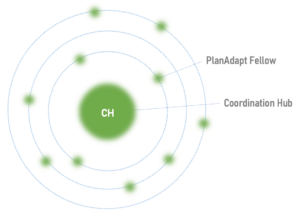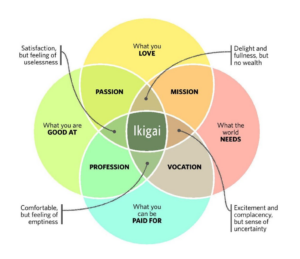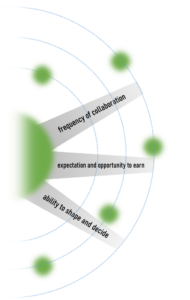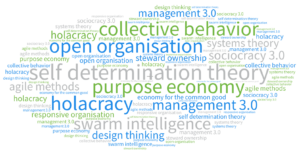Building and Running an Organisation the 21st Century Way

The organizational model of PlanAdapt can be described as an analogy to an atom model. It is primarily driven by two ideas: (1) self-determination and (2) a human-first approach. That means that the ambitions, needs, and aspirations of each individual prevail and that they are put in the center. In too many organisational settings, ambitions or interests of a few (i.e. owners or top managers) who ‘use’ others to generate revenue and exercise power have been the rule. We want each individual to thrive and live up to his or her full potential. This is why we have crafted PlanAdapt’s structure, processes and culture in a different way.

We recognise the nature of human psychology, and a variety of motivations to take meaningful action, by offering a space in which everyone can self-determine the combination of purposes (see also Ikigai concept), i.e. ‘Earn, Learn and Grow together!’ (our motto for Fellowships in the Climate Co-Adaptation Lab), in view of his or her (professional) needs. And further, we recognise the need to care about the problems that one tries to solve professionally. That is also why we care about the motivations and values that everyone brings to PlanAdapt.
The atom model shows how the vicinity to the ‘nucleus’ (i.e. the Coordination Hub) determines and expresses (a) the ability to shape and decide; (b) the expectation and opportunity to earn and (c) the frequency of collaboration. While individuals in the coordination hub lay the groundwork to shape the organisation (covering administration, management, legal, finance, HR etc.), everyone else self-determines what they ‘want’ from an engagement in PlanAdapt and what they are ready to ‘give’. From an organisational development point of view, this highly flexible structure explores the experimental space between formal, full-time employment and a loose and relatively passive membership in a network, that someone else governs and manages.
 Our human-first approach puts the individual much more into the center than usually in organisations. It follows several observations and ideas closely related to self-determination theory, but also an understanding that societal transformation can only start at the individual level. Certain internal qualities and capacities (e.g. cognitive, socio-emotional and relational processes) underpin people’s learning, everyday life choices and decision-making, and can facilitate the paradigm shift needed for a more sustainable future. Eventually, they influence how people process and filter information, take decisions, cooperate and act. We, in PlanAdapt, want to pay more attention to linking internal and external transformation. We also believe that in the 21st century, the split between professional roles and the beliefs, values and aspirations as a citizen, as a human being and the role of every individual as part of a society should not be as distinct as it was treated in many companies and organisations previously. The contributions of humans should not be reduced to being an economic production factor called ‘labor’. This is why we want to help everyone in PlanAdapt to combine professional and other roles, allowing emotions, worldviews, beliefs and values to play a role in our collaboration.
Our human-first approach puts the individual much more into the center than usually in organisations. It follows several observations and ideas closely related to self-determination theory, but also an understanding that societal transformation can only start at the individual level. Certain internal qualities and capacities (e.g. cognitive, socio-emotional and relational processes) underpin people’s learning, everyday life choices and decision-making, and can facilitate the paradigm shift needed for a more sustainable future. Eventually, they influence how people process and filter information, take decisions, cooperate and act. We, in PlanAdapt, want to pay more attention to linking internal and external transformation. We also believe that in the 21st century, the split between professional roles and the beliefs, values and aspirations as a citizen, as a human being and the role of every individual as part of a society should not be as distinct as it was treated in many companies and organisations previously. The contributions of humans should not be reduced to being an economic production factor called ‘labor’. This is why we want to help everyone in PlanAdapt to combine professional and other roles, allowing emotions, worldviews, beliefs and values to play a role in our collaboration.
 Our organisational development approach did not come out of nowhere. We have developed it on the basis of many smart thoughts, theories and practices that inspire us in our daily work and that we rely on (e.g. holacracy, sociocracy 3.0, reinventing organisations, purpose economy, steward ownership, economy for the common good, open organisation, self-determination theory, management 3.0). The concrete tools and methods that we use are adjusted and organically advanced in view of the collective needs of everyone who commits to PlanAdapt’s vision and mission. This mindset, this attitude, is ultimately what makes up the organisation of the future for us. In the end, we see our impact also in having influenced the mindset of each contributor to PlanAdapt, in addition to the impact generated in our projects and initiatives.
Our organisational development approach did not come out of nowhere. We have developed it on the basis of many smart thoughts, theories and practices that inspire us in our daily work and that we rely on (e.g. holacracy, sociocracy 3.0, reinventing organisations, purpose economy, steward ownership, economy for the common good, open organisation, self-determination theory, management 3.0). The concrete tools and methods that we use are adjusted and organically advanced in view of the collective needs of everyone who commits to PlanAdapt’s vision and mission. This mindset, this attitude, is ultimately what makes up the organisation of the future for us. In the end, we see our impact also in having influenced the mindset of each contributor to PlanAdapt, in addition to the impact generated in our projects and initiatives.
Read more about our ideas and concrete approaches on (soon forthcoming):
- how to move beyond supply-driven, centralised knowledge networks, and why knowledge brokering organisations are a needed addition to the landscape of actors in the field of knowledge generation, dissemination and transfer (typically universities, research institutes, consulting companies etc.);
- alternatives to the fly-in fly-out, expert-based knowledge transfer and capacity development model; including the broken Global Northern think tank model;
- overcoming the weaknesses of project funding models by enhancing the legacy of project impact and investing in organisational and institutional capacity;
- sustained collaboration at eye-height and trust building between Global Northern and Southern researchers, experts and consultants, and more profoundly recognising power issues (see also Tilley et al. 2021); and
- alternatives to the ‘Bermuda triangle of pseudo-valuation’ used in the consulting industry, including a broken public tender model by using transparency mechanisms.
